Essential Competencies of an HR Manager in a Global MNC Setting
VerifiedAdded on 2022/10/12
|5
|1082
|453
Report
AI Summary
This report provides a comprehensive overview of the essential competencies required for an HR Manager in a multinational company (MNC). It emphasizes the importance of international human resource management (IHRM) in global business operations and highlights the need for HR directors to possess a broad range of skills. The report categorizes key competencies into business, leadership, change and knowledge management, and professional domains. Business competencies include industry knowledge, competitor analysis, and a global perspective. Leadership competencies involve strategic vision, cultural diversity management, and decision-making skills. Change and knowledge management competencies focus on network building and flexible structure design. Professional competencies encompass staffing, performance management, and employee relations. The report also discusses the four main approaches in IHRM: ethnocentric, polycentric, geocentric, and regiocentric, and stresses the significance of cross-cultural awareness and sensitivity training for employees. The report concludes by referencing several key publications in the field of IHRM.
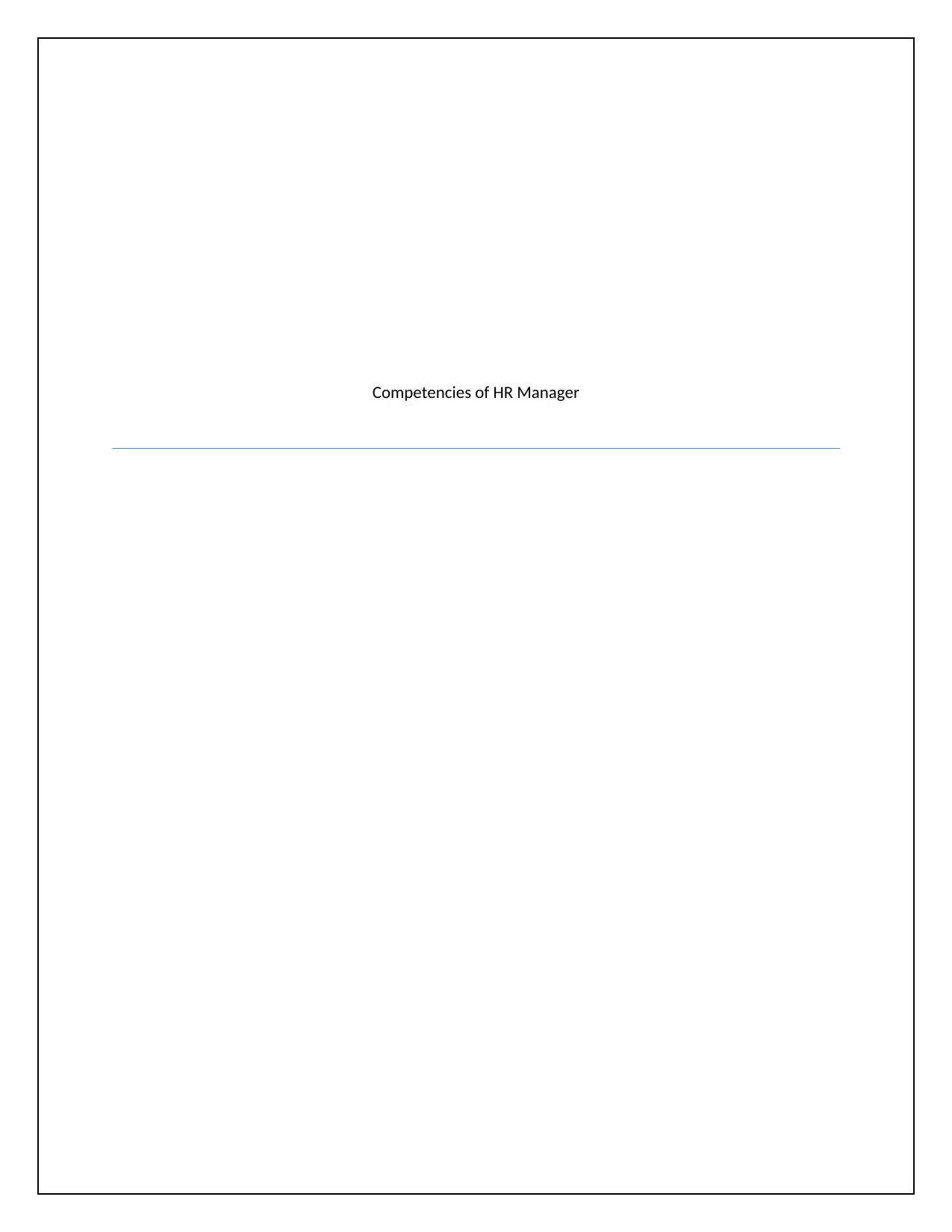
Competencies of HR Manager
Paraphrase This Document
Need a fresh take? Get an instant paraphrase of this document with our AI Paraphraser
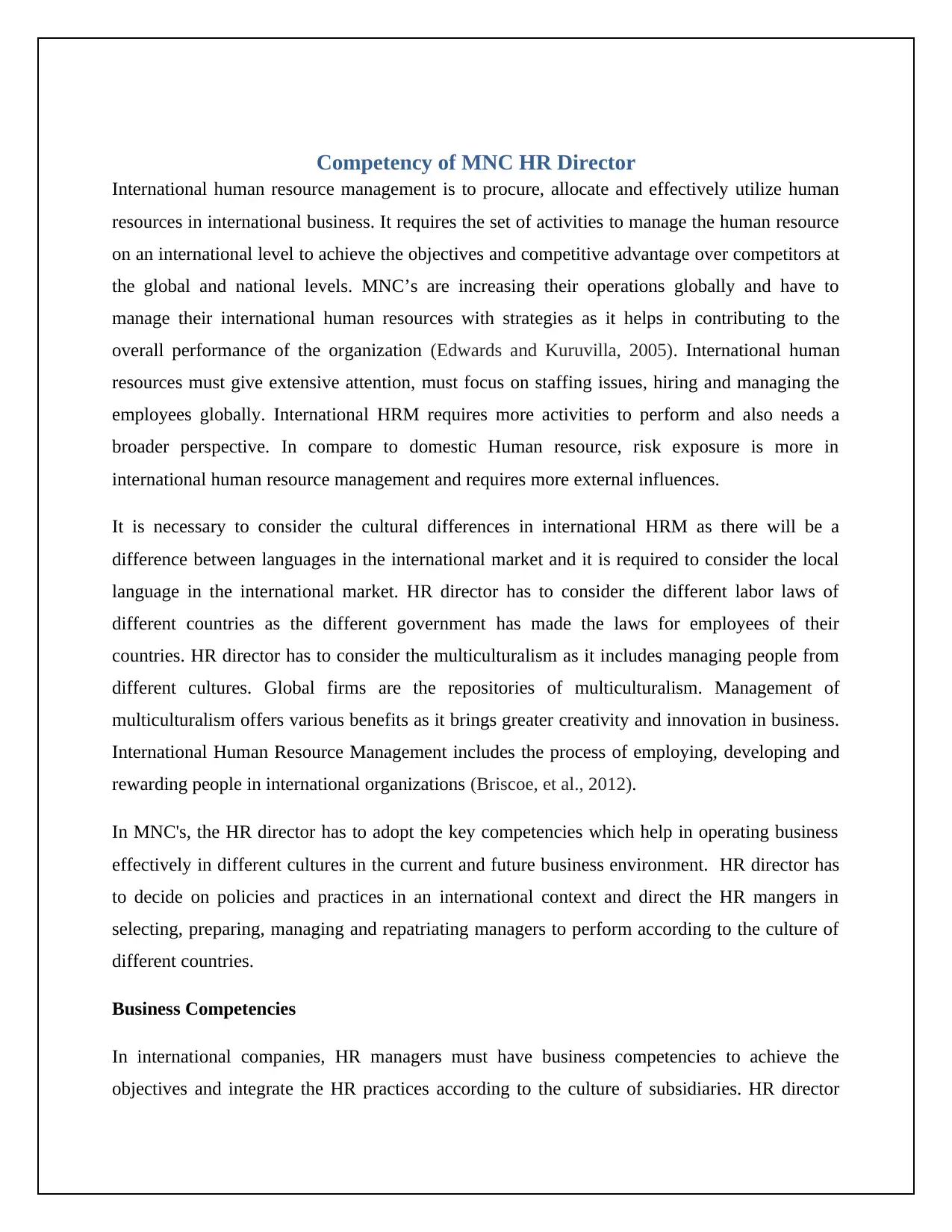
Competency of MNC HR Director
International human resource management is to procure, allocate and effectively utilize human
resources in international business. It requires the set of activities to manage the human resource
on an international level to achieve the objectives and competitive advantage over competitors at
the global and national levels. MNC’s are increasing their operations globally and have to
manage their international human resources with strategies as it helps in contributing to the
overall performance of the organization (Edwards and Kuruvilla, 2005). International human
resources must give extensive attention, must focus on staffing issues, hiring and managing the
employees globally. International HRM requires more activities to perform and also needs a
broader perspective. In compare to domestic Human resource, risk exposure is more in
international human resource management and requires more external influences.
It is necessary to consider the cultural differences in international HRM as there will be a
difference between languages in the international market and it is required to consider the local
language in the international market. HR director has to consider the different labor laws of
different countries as the different government has made the laws for employees of their
countries. HR director has to consider the multiculturalism as it includes managing people from
different cultures. Global firms are the repositories of multiculturalism. Management of
multiculturalism offers various benefits as it brings greater creativity and innovation in business.
International Human Resource Management includes the process of employing, developing and
rewarding people in international organizations (Briscoe, et al., 2012).
In MNC's, the HR director has to adopt the key competencies which help in operating business
effectively in different cultures in the current and future business environment. HR director has
to decide on policies and practices in an international context and direct the HR mangers in
selecting, preparing, managing and repatriating managers to perform according to the culture of
different countries.
Business Competencies
In international companies, HR managers must have business competencies to achieve the
objectives and integrate the HR practices according to the culture of subsidiaries. HR director
International human resource management is to procure, allocate and effectively utilize human
resources in international business. It requires the set of activities to manage the human resource
on an international level to achieve the objectives and competitive advantage over competitors at
the global and national levels. MNC’s are increasing their operations globally and have to
manage their international human resources with strategies as it helps in contributing to the
overall performance of the organization (Edwards and Kuruvilla, 2005). International human
resources must give extensive attention, must focus on staffing issues, hiring and managing the
employees globally. International HRM requires more activities to perform and also needs a
broader perspective. In compare to domestic Human resource, risk exposure is more in
international human resource management and requires more external influences.
It is necessary to consider the cultural differences in international HRM as there will be a
difference between languages in the international market and it is required to consider the local
language in the international market. HR director has to consider the different labor laws of
different countries as the different government has made the laws for employees of their
countries. HR director has to consider the multiculturalism as it includes managing people from
different cultures. Global firms are the repositories of multiculturalism. Management of
multiculturalism offers various benefits as it brings greater creativity and innovation in business.
International Human Resource Management includes the process of employing, developing and
rewarding people in international organizations (Briscoe, et al., 2012).
In MNC's, the HR director has to adopt the key competencies which help in operating business
effectively in different cultures in the current and future business environment. HR director has
to decide on policies and practices in an international context and direct the HR mangers in
selecting, preparing, managing and repatriating managers to perform according to the culture of
different countries.
Business Competencies
In international companies, HR managers must have business competencies to achieve the
objectives and integrate the HR practices according to the culture of subsidiaries. HR director
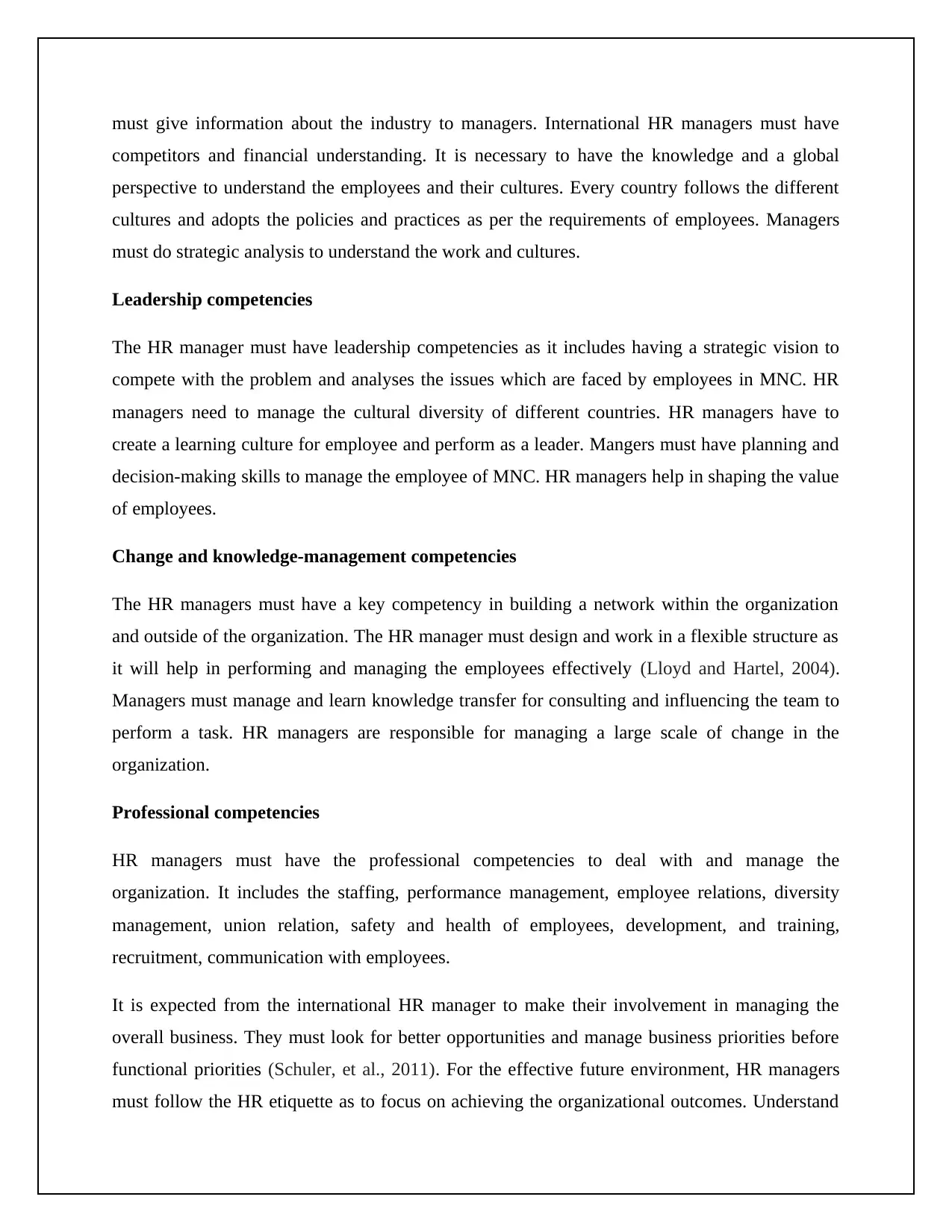
must give information about the industry to managers. International HR managers must have
competitors and financial understanding. It is necessary to have the knowledge and a global
perspective to understand the employees and their cultures. Every country follows the different
cultures and adopts the policies and practices as per the requirements of employees. Managers
must do strategic analysis to understand the work and cultures.
Leadership competencies
The HR manager must have leadership competencies as it includes having a strategic vision to
compete with the problem and analyses the issues which are faced by employees in MNC. HR
managers need to manage the cultural diversity of different countries. HR managers have to
create a learning culture for employee and perform as a leader. Mangers must have planning and
decision-making skills to manage the employee of MNC. HR managers help in shaping the value
of employees.
Change and knowledge-management competencies
The HR managers must have a key competency in building a network within the organization
and outside of the organization. The HR manager must design and work in a flexible structure as
it will help in performing and managing the employees effectively (Lloyd and Hartel, 2004).
Managers must manage and learn knowledge transfer for consulting and influencing the team to
perform a task. HR managers are responsible for managing a large scale of change in the
organization.
Professional competencies
HR managers must have the professional competencies to deal with and manage the
organization. It includes the staffing, performance management, employee relations, diversity
management, union relation, safety and health of employees, development, and training,
recruitment, communication with employees.
It is expected from the international HR manager to make their involvement in managing the
overall business. They must look for better opportunities and manage business priorities before
functional priorities (Schuler, et al., 2011). For the effective future environment, HR managers
must follow the HR etiquette as to focus on achieving the organizational outcomes. Understand
competitors and financial understanding. It is necessary to have the knowledge and a global
perspective to understand the employees and their cultures. Every country follows the different
cultures and adopts the policies and practices as per the requirements of employees. Managers
must do strategic analysis to understand the work and cultures.
Leadership competencies
The HR manager must have leadership competencies as it includes having a strategic vision to
compete with the problem and analyses the issues which are faced by employees in MNC. HR
managers need to manage the cultural diversity of different countries. HR managers have to
create a learning culture for employee and perform as a leader. Mangers must have planning and
decision-making skills to manage the employee of MNC. HR managers help in shaping the value
of employees.
Change and knowledge-management competencies
The HR managers must have a key competency in building a network within the organization
and outside of the organization. The HR manager must design and work in a flexible structure as
it will help in performing and managing the employees effectively (Lloyd and Hartel, 2004).
Managers must manage and learn knowledge transfer for consulting and influencing the team to
perform a task. HR managers are responsible for managing a large scale of change in the
organization.
Professional competencies
HR managers must have the professional competencies to deal with and manage the
organization. It includes the staffing, performance management, employee relations, diversity
management, union relation, safety and health of employees, development, and training,
recruitment, communication with employees.
It is expected from the international HR manager to make their involvement in managing the
overall business. They must look for better opportunities and manage business priorities before
functional priorities (Schuler, et al., 2011). For the effective future environment, HR managers
must follow the HR etiquette as to focus on achieving the organizational outcomes. Understand
⊘ This is a preview!⊘
Do you want full access?
Subscribe today to unlock all pages.

Trusted by 1+ million students worldwide
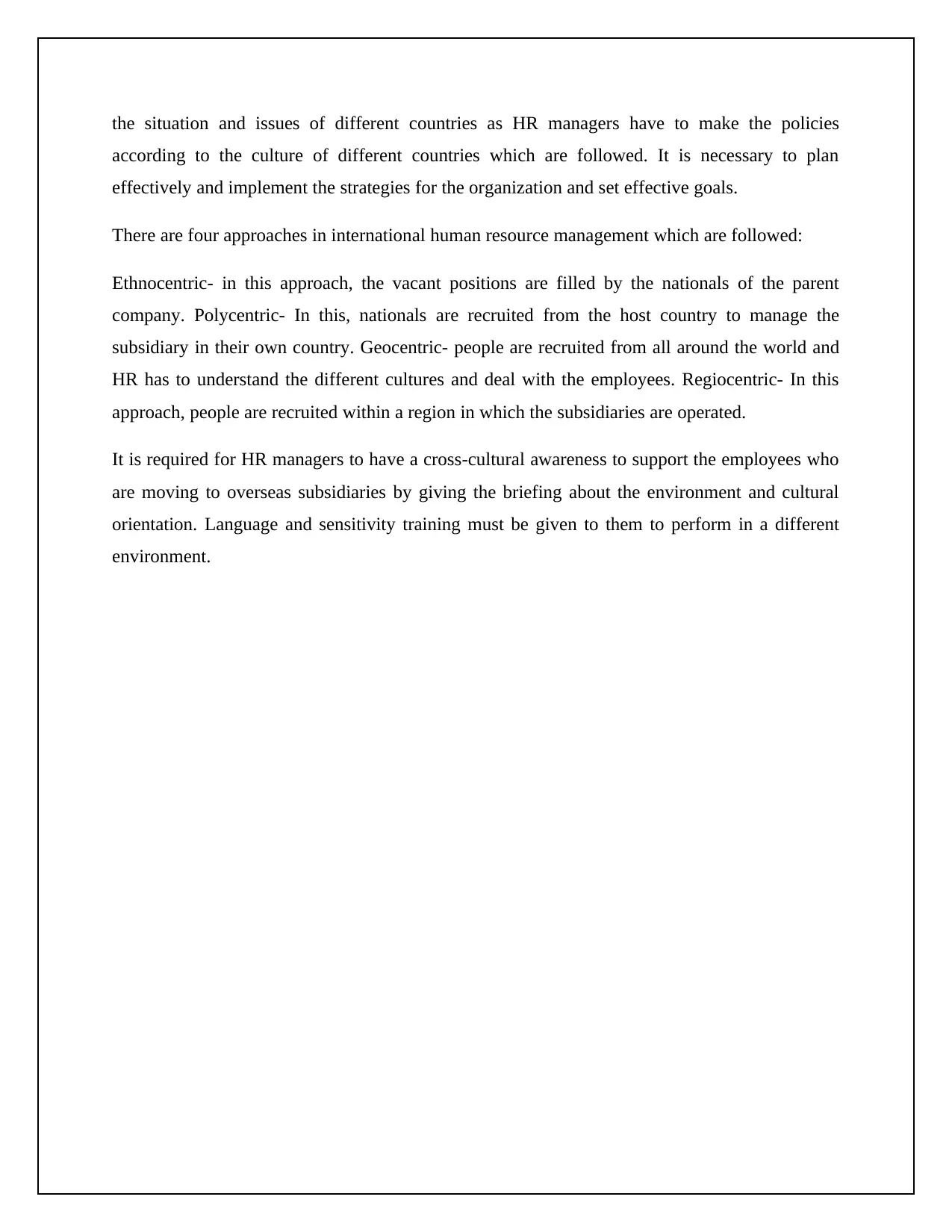
the situation and issues of different countries as HR managers have to make the policies
according to the culture of different countries which are followed. It is necessary to plan
effectively and implement the strategies for the organization and set effective goals.
There are four approaches in international human resource management which are followed:
Ethnocentric- in this approach, the vacant positions are filled by the nationals of the parent
company. Polycentric- In this, nationals are recruited from the host country to manage the
subsidiary in their own country. Geocentric- people are recruited from all around the world and
HR has to understand the different cultures and deal with the employees. Regiocentric- In this
approach, people are recruited within a region in which the subsidiaries are operated.
It is required for HR managers to have a cross-cultural awareness to support the employees who
are moving to overseas subsidiaries by giving the briefing about the environment and cultural
orientation. Language and sensitivity training must be given to them to perform in a different
environment.
according to the culture of different countries which are followed. It is necessary to plan
effectively and implement the strategies for the organization and set effective goals.
There are four approaches in international human resource management which are followed:
Ethnocentric- in this approach, the vacant positions are filled by the nationals of the parent
company. Polycentric- In this, nationals are recruited from the host country to manage the
subsidiary in their own country. Geocentric- people are recruited from all around the world and
HR has to understand the different cultures and deal with the employees. Regiocentric- In this
approach, people are recruited within a region in which the subsidiaries are operated.
It is required for HR managers to have a cross-cultural awareness to support the employees who
are moving to overseas subsidiaries by giving the briefing about the environment and cultural
orientation. Language and sensitivity training must be given to them to perform in a different
environment.
Paraphrase This Document
Need a fresh take? Get an instant paraphrase of this document with our AI Paraphraser
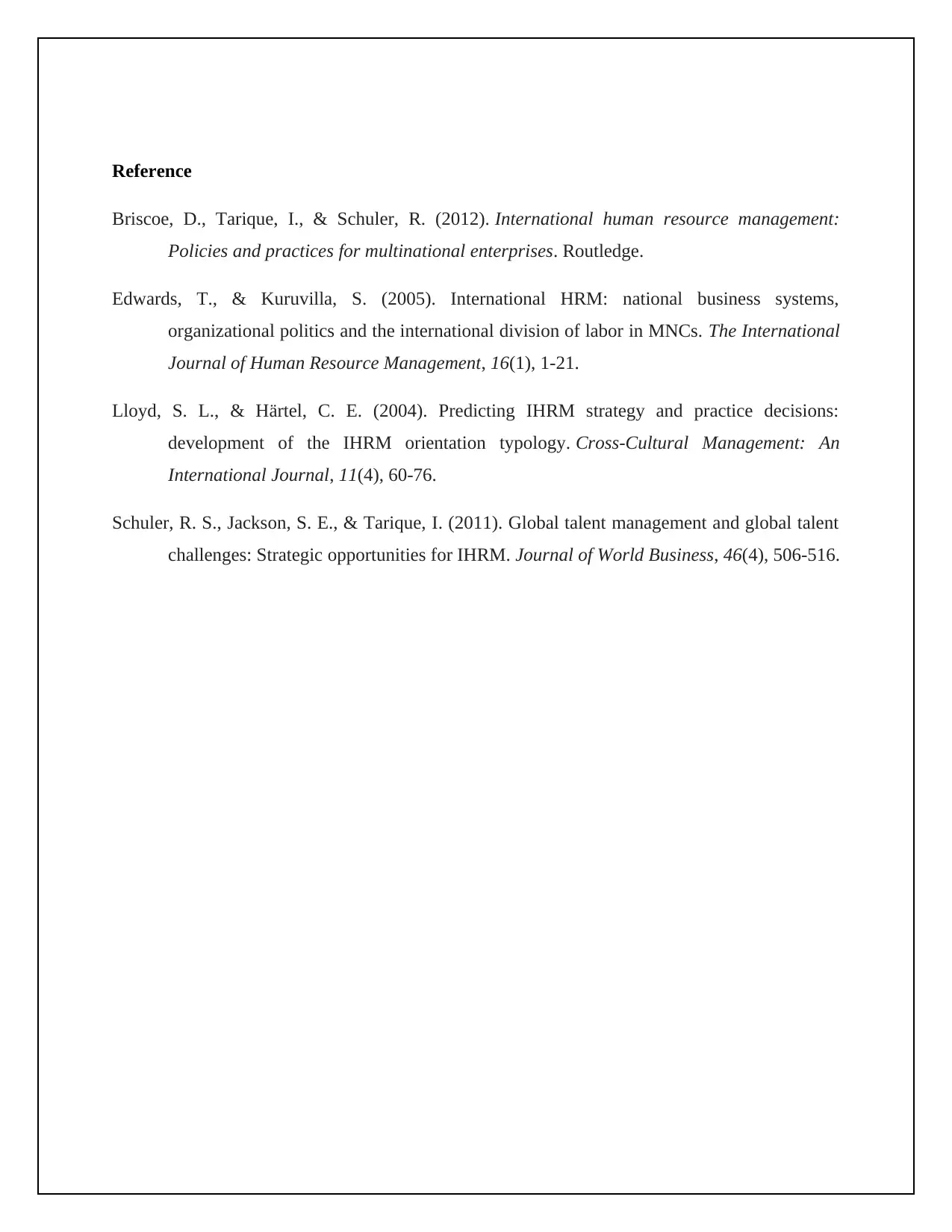
Reference
Briscoe, D., Tarique, I., & Schuler, R. (2012). International human resource management:
Policies and practices for multinational enterprises. Routledge.
Edwards, T., & Kuruvilla, S. (2005). International HRM: national business systems,
organizational politics and the international division of labor in MNCs. The International
Journal of Human Resource Management, 16(1), 1-21.
Lloyd, S. L., & Härtel, C. E. (2004). Predicting IHRM strategy and practice decisions:
development of the IHRM orientation typology. Cross-Cultural Management: An
International Journal, 11(4), 60-76.
Schuler, R. S., Jackson, S. E., & Tarique, I. (2011). Global talent management and global talent
challenges: Strategic opportunities for IHRM. Journal of World Business, 46(4), 506-516.
Briscoe, D., Tarique, I., & Schuler, R. (2012). International human resource management:
Policies and practices for multinational enterprises. Routledge.
Edwards, T., & Kuruvilla, S. (2005). International HRM: national business systems,
organizational politics and the international division of labor in MNCs. The International
Journal of Human Resource Management, 16(1), 1-21.
Lloyd, S. L., & Härtel, C. E. (2004). Predicting IHRM strategy and practice decisions:
development of the IHRM orientation typology. Cross-Cultural Management: An
International Journal, 11(4), 60-76.
Schuler, R. S., Jackson, S. E., & Tarique, I. (2011). Global talent management and global talent
challenges: Strategic opportunities for IHRM. Journal of World Business, 46(4), 506-516.
1 out of 5
Related Documents
Your All-in-One AI-Powered Toolkit for Academic Success.
+13062052269
info@desklib.com
Available 24*7 on WhatsApp / Email
![[object Object]](/_next/static/media/star-bottom.7253800d.svg)
Unlock your academic potential
Copyright © 2020–2026 A2Z Services. All Rights Reserved. Developed and managed by ZUCOL.




